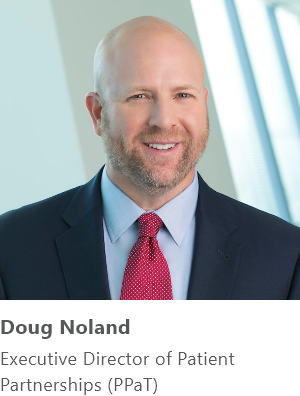World Patient Safety Day: Elevate the voice of patients!

World Patient Safety Day is observed every year on September 17 and is a call from the World Health Organization (WHO) for "solidarity and concerted action by all countries and international partners to improve patient safety." In 2023, the focal theme is Engaging Patients for Patient Safety, and the accompanying slogan is “Elevate the voice of patients!”
The reason behind Patient Safety Day
Why does a critical aspect like patient safety require a dedicated campaign? Shouldn't guaranteeing patient safety be a fundamental day-to-day principle of the healthcare industry?
Doug Noland, Executive Director and Head of Patient Partnership Team (PPAT) explains the essential nature of patient safety is precisely why it requires regular awareness. "The significance of Patient Safety Day lies in keeping it front of mind. Dedicated days such as this prevent us from overlooking its importance under the assumption that we are already practicing it diligently. At Astellas, we focus on the concept of 'even more,' being even more committed to safety, even more committed to advocacy, and even more committed to VALUE."
He continues by highlighting a common bias. "The industry often leans toward efficacy, emphasizing clinical trial endpoints that address patient symptoms and concerns. However, patient feedback and proactive measures contribute significantly to patient safety. In addition to post-event pharmacovigilance, understanding patients’ needs and concerns through interviews, focus groups, and advisory panels helps prevent safety issues in the first place."
Trust and transparency at the center of human-focused engagement
The theme of Engaging Patients for Patient Safety directly aligns with Doug's work at PPAT. PPAT actively engages in discussions with patients and caregivers around the world to better understand their journey. A passionate team of over 30 working around the world to foster meaningful engagement between patients or caregivers and Astellas' research and development teams. Doug states, "Our approach transcends academic understanding, focusing on connecting at a human level, recognizing unspoken cues, and taking the time to truly comprehend patient experiences.”
This empathy-driven strategy proves crucial in drug and treatment regimen development. However, in order to reach that point, building relationships with patient advocacy groups and organizations is key. “We want to create a relationship that's built on meaning, purpose, and mutual value. Many groups are formed by individuals or family members who are simply looking for hope. We appreciate their work greatly and treat them as partners and aim to create an environment of trust, collaboration and respect."
But how do the voices of individual patients translate into creating drugs for a general patient population? Doug responds by saying, "Some aspects may only matter to small groups of patients, but for that particular patient population, they really matter. For example, certain requirements in clinical trials may be challenging for a subset of patients. It becomes a meaningful improvement if we can address these challenges for that specific group without negatively affecting the majority.
The Patient Partnerships team is on a safety mission
PPAT is actively involved in various aspects of patient care and safety, often centered around raising awareness. Doug highlights two initiatives that aimed to encourage a better understanding about two specific diseases.
"In the field of ophthalmology, we simulated visual impairment scenarios for our researchers to better understand the struggles of patients’ living with deteriorating eyesight. There are obvious safety concerns with any visual impairment, so we want to ensure we are doing what we can to improve, address and mitigate the concerns.
Similarly, in Japan, our team organized a 'Patient Shoes' workshop, where our researchers and developers could experience something close to a patient's perspective. Numbness in the hands is a common side effect of cancer treatments, so to better understand this situation, participants wore thick or restrictive rubber gloves to handle devices. Through this, our researchers and developers could experience what might happen after taking medicines and imagine the potential safety implications.
Doug concludes by saying, “Ultimately, our mission is to positively impact the lives of the patients we serve and uphold their safety as a top priority. We will continuously represent the voice of the patients and create moments where patients or their caregivers can sit down with employees working on our development programs to share information about their lives, challenges and experiences."
Learn more about Astellas' Patient Centricity team and why their work is all about action.
Astellas Patient Centricity Series
Behavioral Insights for Patient Outcomes: In conversation with the Behavioral Science Consortium
Read morePatient Centricity Solve-a-Thon: Igniting the Collective Imagination to Tackle Unmet Medical Needs
Read more
Related Links








